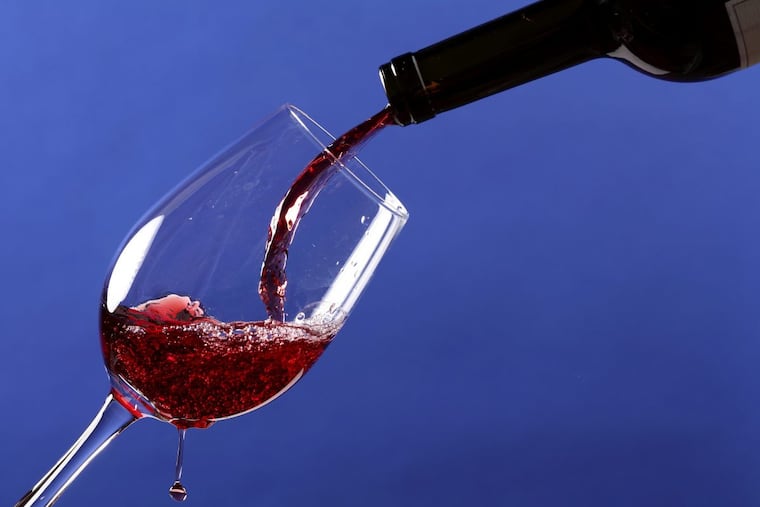Alcohol sales are up in Philly. Is the soda tax driving us to drink?
Sales of wine and spirits in Philadelphia increased by more than 5 percent last year.

Looking to see what might happen when soft drinks and other sugary beverages are taxed, British researchers found something interesting: People seem to buy less soda and more alcohol.
So, what about Philadelphia, which added a tax to all sweetened drinks a little more than a year ago? The same association appears to be holding here, with residents buying less soda and more booze lately.
But as all good scientists know, causation does not always equal correlation. And Philadelphia has a whole lot more going on than the beverage tax that might push alcohol sales.
Think Eagles, beer gardens, and clever liquor promotions.
In Great Britain, researchers looked at 32,000 households and found that an increase in the price of sugary drinks may change purchasing patterns when it comes to alcohol, a study in the Journal of Epidemiology and Community Health reported Tuesday.
The study took place from January to December 2013, looking at the sales of six million servings of beer, lager (which apparently gets its own category there), cider, wines and spirits.
The British researchers found that when high-sugar drinks cost more, lager sales go up. For medium-sugar drinks, alcohol sales go down. But boosting the price of diet/low-sugar drinks was connected to greater beer, cider, and wine sales.
Low-income households, not surprisingly, proved most sensitive to price increases in sweetened beverages, they concluded.
After the 1.5-cents-per-ounce Philadelphia tax was imposed, sales of soda and other sweetened beverages dropped by 57 percent by volume during the first six months of 2017.
At the same time, there was a 5 percent increase in retail sales of wine and spirits during the correlating fiscal year, compared to the previous one, according to the state Liquor Control Board.
But that was no accident and is considered good news for the organization whose job it is to raise revenue for Pennsylvania's general fund, said LCB spokesman Shawn Kelly.
"We are constantly rebranding stores and trying new promotions," he said. "We are always trying to drive traffic into our stores."
In Philadelphia, all categories of wine — red, white, rosé — showed an increase in sales during 2017, as did brandy/cognac, gin, tequila, and whisky.
But in other categories — such as vodka, rum, cordials, and ready-to-drink cocktails — sales decreased, according to Liquor Control Board data. Generally speaking, Kelly said, the LCB sees sales increases every year. So it would be difficult to attribute the sales boost to the sugary drinks tax, he said.
The LCB, of course, doesn't handle beer sales. And the Pennsylvania Beer Alliance does not track sales by county, said Francis X. O'Brien, the group's attorney.
At Cicione Beverage at 1729 S. 20th St., owner Gary Patel saw a 1 percent increase in beer sales in 2017, compared with 2016. His explanation: a change in the law to allow sales of 12-packs, 6-packs, and singles, as well as a younger crowd moving into the neighborhood. And, of course, the Eagles.
Though sales in December around Eagles games were very good, "the playoff thing has really helped the most," he said.
Consider this: At Cicione this week, a 24-pack of 12-ounce Coke cans costs $16.20; the same amount of Yuengling Premium is $15.88
City spokesman Mike Dunn said in a statement it would be quite a stretch to assume any change in alcohol sales could be tied to the sweetened beverage tax.
"We can't speak to what's happening in Britain, but here in Philadelphia, a whole host of factors could be at play," said Dunn. There is the growth of tourism, the popularity of beer gardens, and the fact that 2017 was the first full year when some grocery stores could sell beer and wine.
But overall, the sugary drinks tax didn't have an influence on the city's economy during the first six months of 2017, said Sara Bleich, a professor of public health policy at the Harvard T.H. Chan School of Public Health, and part of a group studying the effects of the tax.
Anthony Campisi, a spokesman for the Ax the Beverage Tax campaign, said the British study made sense to him, considering how shoppers might make substitutions at the cash register if prices change.
"It seems to undercut public health arguments," he said. "I can't imagine public health advocates wanted alcohol consumption to increase."
But the tax is levied at the point of distribution, not at the cash register, Dunn said.
"Only when distributors and dealers make private business decisions to pass on the cost of the tax would shoppers see an increase," he said.